Some things never change. In Haiti, no matter the century or decade in question, one can be certain that the ruling elite is trouncing the rights and needs of the majority, while the powerless and helpless population is protesting to demand food, land, and justice, and the international community is taking care with all necessary means that a local comprador class stays in power and guarantees the continuing exploitation of people and resources.
Five years after the earthquake that killed an estimated 240,000 Haitians (no one knows for sure), destroyed 106,000 homes, and made 1.8 million homeless, 86,000 Haitians still live in 123 displaced people’s camps. The children in these camps are particularly vulnerable as they are growing up with limited or no access to everyday basic services such as water, sanitation, health care, and schools.
Haitians earn less today than they did under the Duvalier dictatorship, unemployment is 40 percent, most Haitians live in absolute poverty.
Since the US-coup against President Jean-Bertrand Aristide experts from USAID and other Western agencies worked tirelessly to disassemble Haiti’s rural economy in favor of cash crops for export and by 2003 approximately 80 percent of all rice consumed in Haiti was imported from the USA.
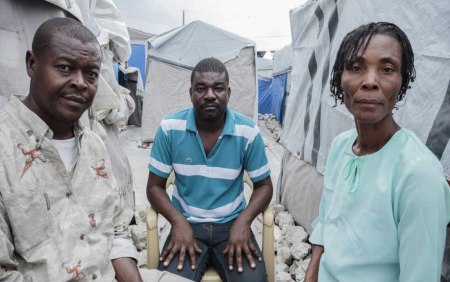
After the earthquake in January 2010 former US-President Bill Clinton formed CIRH (the Interim Commission for the Reconstruction of Haiti). The Haitian parliament was forced to declare a state of emergency for 18 months during which Clinton and his CIRH group could do as they pleased with the result that not much has been accomplished and the CIRH is now viewed by most Haitians and also many independent observers to have been a fraudulent scheme. Nearly all of the donor money ended in the coffers of US businesses and US NGOs.
The top 5 contractors which received funds related to Haiti in the past 5 years:
1. Chemonics International Inc (US development company) 118 million US$
2. Development Alternatives INC. (US consultant firm) 67 million US$
3. Cce/Dfs Inc (US consultant firm) 20 million US$
4. Tetra Tech INC (US consultant, engineering, etc., firm). 16 million US$
5. Pathfinder International (US NGO) 16 million US$
After paying the stuff of these companies there was not much money left and the resulting meager reconstruction efforts didn’t result in improved public services but rather focused on mining, garment, and tourism in an effort to convert Haiti in a “sweatshop paradise” for US corporations.
A new Marriott hotel got 26.5 million US$ from the World Bank and the Clinton-Bush Haiti Fund invested 2 million US$ in the luxurious Royal Oasis Hotel, while new housing projects for the population, with homes for about 3,400 families, did cost 88 million US$. Many of the flats in these apartment blocks are empty because Haitians cannot afford the rent.
Haitians who work in the giant Caracol Industrial Park inaugurated in March 2013 end up with not more than 1,36 US$ a day. The small farmers who were expelled from their plots to make way for the park are still without land.
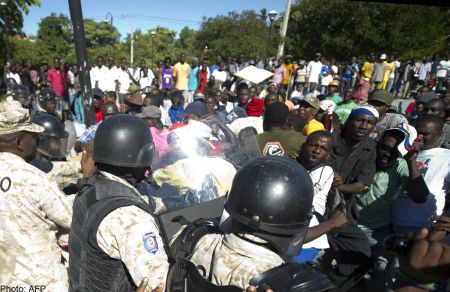
MSF (Médecins Sans Frontières), reports that the vast majority of Haitians still struggle to access basic health care. For example, the HUEH (Hôpital de l’Université d’Etat d’Haiti), the only public hospital offering orthopedic surgical care in the country, has still not been fully restored. Furthermore, while money has been spent on building hospitals, quite a few, such as one built in Carrefour, currently stand as empty shells because of inadequate planning to ensure proper trained staff, sufficient drugs, medical equipment, and maintenance.
MSF continues to manage four hospitals in the earthquake-affected areas of Port-au-Prince and Léogâne, providing emergency trauma and obstetric care, neonatal emergency health care, and treatment of severe burns, it also has treated more than 204,000 victims of cholera since 2010.
A Western style democracy
The election of Michel Martelly became a mere formality after an electoral commission excluded Fanmi Lavalas (the party of Jean-Bertrand Aristide) from participation. Fanmi Lavalas had in various opinion pols a majority of some 80 percent, it would have swept the election in a landslide.
Consequently not even 20 percent of Haitians participated in the elections.
The fraudulently elected administration of Michel Martelly has recently abandoned any pretense of democracy. Having failed to hold elections three years in a row and instead letting national and local elective seats become vacant, Martelly now rules by decree. Anti-government street protests have become increasingly common in downtown Port-au-Prince, while the US paid and trained police responds with tear gas, water cannons, and occasionally live rounds.
The Haitian police is trained by the private military and security contractor (PMSC) DynCorp, it is known for its brutality and disregard of life. Yet all this seems to be not sufficient to keep the population in check and therefore the UN has to help keeping the status quo with heavily armed soldiers.
The UN occupation force
Undeterred by brutal oppression Haitians have taken to the streets since ten years, demanding an end to Western occupation by the UN-force MINUSTAH, which has 8,000 foreign soldiers stationed.
Haitians view MINUSTAH as an attempt by the USA, Canada, and France to neutralize the supporters of Fanmi Lavalas, Aristide’s party, and secure the various by the West installed governments. MINUSTAH has carried out numerous bloody raids in the Cité Soleil section of Port-au-Prince against Fanmi Lavalas supporters, resulting in hundreds of casualties.
In early 2005, MINUSTAH commander Lieutenant-General Augusto Heleno testified at a congressional commission in Brazil that “we are under extreme pressure from the international community to use violence,” citing Canada, France, and the USA. Having ended his tour of duty in September 2005, Heleno was replaced by General Urano Bacellar. In January 2006, Bacellar reportedly committed suicide. Diplomatic cables released by Wikileaks suggest, that he was assassinated by contras affiliated with the “Group 184” and supported by Washington.
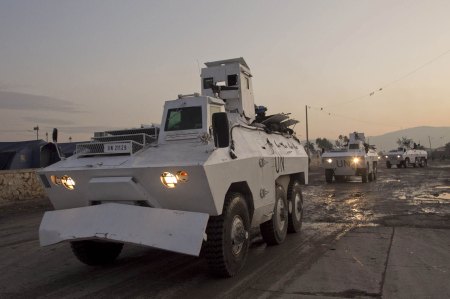
MINUSTAH soldiers were involved in gang rapes of women and children, the UN Office of Internal Oversight Services itself concluded, that: “acts of sexual exploitation and abuse (against children) were frequent and occurred usually at night, and at virtually every location where the contingent personnel were deployed.”
A cholera epidemic which sickened 800,000 and killed 9,000 was attributed to faulty construction of the sanitation system in the MINUSTAH base at Méyè.
An Interview with Human Rights Organizer Jackson Doliscar
Beverly Bell otherworldsarepossible.org
Jackson Doliscar is a community organizer and human rights defender. Since the earthquake, he has been the primary outreach worker in an international campaign for the right to housing for those left languishing under tents, through the Force for Reflection and Action on Housing (FRAKKA, by its Creole acronym).
Beverly Bell: Protests have been consistently underway for weeks. The government is in crisis and Prime Minister Lamothe, the neoliberal backbone of the government, has resigned. What’s going on?
Jackson Doliscar: The Martelly government that’s been in power for four years should have organized elections every year. In its quest to achieve a totalitarian government, it hasn’t organized any election. Every year, a third of the senate must be renewed. This hasn’t happened. As a result, by January 12, two-thirds of the senate will be gone; we’ll be left with only 10 senators out of 30. [The same has transpired with the national legislature and local posts.] That’s the goal Martelly has pursued so he can rule by decree and be solely in charge of making law.
We have to be very vigilant to prevent the rise of another dictatorship, patterned after François Duvalier’s. The international community has to be vigilant, too, to insure that the country takes steps to implement overdue elections to salvage what remains of this deficient, pseudo-democracy.
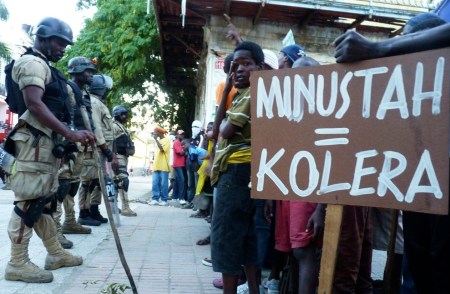
Beverly Bell: What has been the role of the US government vis-à-vis the Martelly Administration?
Jackson Doliscar: The international community saw in Martelly a man who would meet its dictates. It backed him and promoted him in the race for the presidency. The international community, with the US as its key player, found in Martelly the man to implement its goals, namely free access to land for international mining corporations, for tourism development, and for partnerships with big international conglomerates — to the detriment and displacement of the peasantry.
People in Haiti don’t believe the international community, especially the American government, is interested in seeing elections. In spite of all that’s wrong with the Martelly government, namely its corruption and mismanagement, the international community still supports him, giving him high marks for the job he’s doing.
This is a cruel process on the part of the American government. It’s in contradiction with American claims to promote democracy in the world, just like we saw with its ongoing support of Papa Doc and Baby Doc [François and Jean-Claude Duvalier, who ruled for 30 years with steady US political and financial backing except for a brief time under Kennedy]. Those two created the roadmap that Martelly is following today.
Beverly Bell: Jackson, tell us about the state of the right to housing for those left homeless by the earthquake, and the right to land for those displaced for mega-development projects.
Jackson Doliscar: The problems of land and housing in Haiti are crucial, and require a lot people working towards resolving them and defending the rights of the people involved: peasants, and people who lost their homes in the earthquake. Then there are people whose shelters have been destroyed by the government, like in Port-au-Prince where the government has forced out more than 60,000 inhabitants [from displaced persons camps].
Let’s talk about forced evictions in pursuit of the Martelly government’s slogan “Haiti is open for business.” The government is kicking people off their lands to sell off the country piece by piece. The government is displacing people in order to create tourism zones, like on Ile-à-Vâche [a small island off the northern coast of Haiti]. That island used to have two police officers who provided all the security, and now, at the drop of the hat, they have 100 BIM officers [Motorized Intervention Brigades, a special unit of the Haitian National Police] to put pressure on people and physically threaten them.
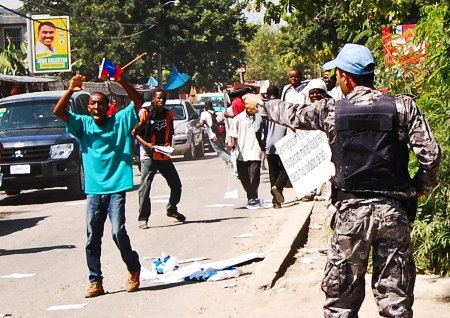
Beverly Bell: Tell more about the forced evictions that are taking place in displaced persons camps as well. Why are they doing that?
Jackson Doliscar: The government is disseminating propaganda saying that they’ve resettled people from the tent camps, but there are still many people in them. It’s hard to make a true count of how many: the International Organization of Migration says 80,000 in Port-au-Prince now, but we think there are more. So the government has to evict the inhabitants so no one can see that there so many people left homeless and living in such terrible conditions.
There are other instances where people who claim to be landowners are trying to force people out of the camps, claiming they need to use the land. Sometimes they show up with the police to force everyone out; sometimes they set the camps on fire. For example, on January 11, 2014, a group of hired thugs set fire to a camp in Delmas 3 in Port-au-Prince. Three children were burned alive.
Beverly Bell: What threats are people facing in the work to defend democracy and the right to land and housing?
Jackson Doliscar: Human rights laws, and those working to protect them, are in great danger today. Defenders of human rights become victims themselves, suffering serious threats and pressures. The government has arrested and imprisoned people because of their political convictions, their organizational involvement, their protests against the corruption they see in the state, et cetera. There are more than 20 political prisoners being held right now, and that includes human rights lawyers.
To finish, evictions and attacks against human rights workers are two things that we take very seriously. This is a far-right government that is generally unconcerned with human rights, but they have to take responsibility and provide security. Human rights are what make democracy work worldwide, and it’s up to the government to ensure their protection.

Five years after the earthquake that killed an estimated 240,000 Haitians (no one knows for sure), destroyed 106,000 homes, and made 1.8 million homeless, 86,000 Haitians still live in 123 displaced people’s camps. The children in these camps are particularly vulnerable as they are growing up with limited or no access to everyday basic services such as water, sanitation, health care, and schools.
Haitians earn less today than they did under the Duvalier dictatorship, unemployment is 40 percent, most Haitians live in absolute poverty.
Since the US-coup against President Jean-Bertrand Aristide experts from USAID and other Western agencies worked tirelessly to disassemble Haiti’s rural economy in favor of cash crops for export and by 2003 approximately 80 percent of all rice consumed in Haiti was imported from the USA.

After the earthquake in January 2010 former US-President Bill Clinton formed CIRH (the Interim Commission for the Reconstruction of Haiti). The Haitian parliament was forced to declare a state of emergency for 18 months during which Clinton and his CIRH group could do as they pleased with the result that not much has been accomplished and the CIRH is now viewed by most Haitians and also many independent observers to have been a fraudulent scheme. Nearly all of the donor money ended in the coffers of US businesses and US NGOs.
The top 5 contractors which received funds related to Haiti in the past 5 years:
1. Chemonics International Inc (US development company) 118 million US$
2. Development Alternatives INC. (US consultant firm) 67 million US$
3. Cce/Dfs Inc (US consultant firm) 20 million US$
4. Tetra Tech INC (US consultant, engineering, etc., firm). 16 million US$
5. Pathfinder International (US NGO) 16 million US$
After paying the stuff of these companies there was not much money left and the resulting meager reconstruction efforts didn’t result in improved public services but rather focused on mining, garment, and tourism in an effort to convert Haiti in a “sweatshop paradise” for US corporations.
A new Marriott hotel got 26.5 million US$ from the World Bank and the Clinton-Bush Haiti Fund invested 2 million US$ in the luxurious Royal Oasis Hotel, while new housing projects for the population, with homes for about 3,400 families, did cost 88 million US$. Many of the flats in these apartment blocks are empty because Haitians cannot afford the rent.
Haitians who work in the giant Caracol Industrial Park inaugurated in March 2013 end up with not more than 1,36 US$ a day. The small farmers who were expelled from their plots to make way for the park are still without land.

MSF (Médecins Sans Frontières), reports that the vast majority of Haitians still struggle to access basic health care. For example, the HUEH (Hôpital de l’Université d’Etat d’Haiti), the only public hospital offering orthopedic surgical care in the country, has still not been fully restored. Furthermore, while money has been spent on building hospitals, quite a few, such as one built in Carrefour, currently stand as empty shells because of inadequate planning to ensure proper trained staff, sufficient drugs, medical equipment, and maintenance.
MSF continues to manage four hospitals in the earthquake-affected areas of Port-au-Prince and Léogâne, providing emergency trauma and obstetric care, neonatal emergency health care, and treatment of severe burns, it also has treated more than 204,000 victims of cholera since 2010.
A Western style democracy
The election of Michel Martelly became a mere formality after an electoral commission excluded Fanmi Lavalas (the party of Jean-Bertrand Aristide) from participation. Fanmi Lavalas had in various opinion pols a majority of some 80 percent, it would have swept the election in a landslide.
Consequently not even 20 percent of Haitians participated in the elections.
The fraudulently elected administration of Michel Martelly has recently abandoned any pretense of democracy. Having failed to hold elections three years in a row and instead letting national and local elective seats become vacant, Martelly now rules by decree. Anti-government street protests have become increasingly common in downtown Port-au-Prince, while the US paid and trained police responds with tear gas, water cannons, and occasionally live rounds.
The Haitian police is trained by the private military and security contractor (PMSC) DynCorp, it is known for its brutality and disregard of life. Yet all this seems to be not sufficient to keep the population in check and therefore the UN has to help keeping the status quo with heavily armed soldiers.
The UN occupation force
Undeterred by brutal oppression Haitians have taken to the streets since ten years, demanding an end to Western occupation by the UN-force MINUSTAH, which has 8,000 foreign soldiers stationed.
Haitians view MINUSTAH as an attempt by the USA, Canada, and France to neutralize the supporters of Fanmi Lavalas, Aristide’s party, and secure the various by the West installed governments. MINUSTAH has carried out numerous bloody raids in the Cité Soleil section of Port-au-Prince against Fanmi Lavalas supporters, resulting in hundreds of casualties.
In early 2005, MINUSTAH commander Lieutenant-General Augusto Heleno testified at a congressional commission in Brazil that “we are under extreme pressure from the international community to use violence,” citing Canada, France, and the USA. Having ended his tour of duty in September 2005, Heleno was replaced by General Urano Bacellar. In January 2006, Bacellar reportedly committed suicide. Diplomatic cables released by Wikileaks suggest, that he was assassinated by contras affiliated with the “Group 184” and supported by Washington.

MINUSTAH soldiers were involved in gang rapes of women and children, the UN Office of Internal Oversight Services itself concluded, that: “acts of sexual exploitation and abuse (against children) were frequent and occurred usually at night, and at virtually every location where the contingent personnel were deployed.”
A cholera epidemic which sickened 800,000 and killed 9,000 was attributed to faulty construction of the sanitation system in the MINUSTAH base at Méyè.
An Interview with Human Rights Organizer Jackson Doliscar
Beverly Bell otherworldsarepossible.org
Jackson Doliscar is a community organizer and human rights defender. Since the earthquake, he has been the primary outreach worker in an international campaign for the right to housing for those left languishing under tents, through the Force for Reflection and Action on Housing (FRAKKA, by its Creole acronym).
Beverly Bell: Protests have been consistently underway for weeks. The government is in crisis and Prime Minister Lamothe, the neoliberal backbone of the government, has resigned. What’s going on?
Jackson Doliscar: The Martelly government that’s been in power for four years should have organized elections every year. In its quest to achieve a totalitarian government, it hasn’t organized any election. Every year, a third of the senate must be renewed. This hasn’t happened. As a result, by January 12, two-thirds of the senate will be gone; we’ll be left with only 10 senators out of 30. [The same has transpired with the national legislature and local posts.] That’s the goal Martelly has pursued so he can rule by decree and be solely in charge of making law.
We have to be very vigilant to prevent the rise of another dictatorship, patterned after François Duvalier’s. The international community has to be vigilant, too, to insure that the country takes steps to implement overdue elections to salvage what remains of this deficient, pseudo-democracy.

Beverly Bell: What has been the role of the US government vis-à-vis the Martelly Administration?
Jackson Doliscar: The international community saw in Martelly a man who would meet its dictates. It backed him and promoted him in the race for the presidency. The international community, with the US as its key player, found in Martelly the man to implement its goals, namely free access to land for international mining corporations, for tourism development, and for partnerships with big international conglomerates — to the detriment and displacement of the peasantry.
People in Haiti don’t believe the international community, especially the American government, is interested in seeing elections. In spite of all that’s wrong with the Martelly government, namely its corruption and mismanagement, the international community still supports him, giving him high marks for the job he’s doing.
This is a cruel process on the part of the American government. It’s in contradiction with American claims to promote democracy in the world, just like we saw with its ongoing support of Papa Doc and Baby Doc [François and Jean-Claude Duvalier, who ruled for 30 years with steady US political and financial backing except for a brief time under Kennedy]. Those two created the roadmap that Martelly is following today.
Beverly Bell: Jackson, tell us about the state of the right to housing for those left homeless by the earthquake, and the right to land for those displaced for mega-development projects.
Jackson Doliscar: The problems of land and housing in Haiti are crucial, and require a lot people working towards resolving them and defending the rights of the people involved: peasants, and people who lost their homes in the earthquake. Then there are people whose shelters have been destroyed by the government, like in Port-au-Prince where the government has forced out more than 60,000 inhabitants [from displaced persons camps].
Let’s talk about forced evictions in pursuit of the Martelly government’s slogan “Haiti is open for business.” The government is kicking people off their lands to sell off the country piece by piece. The government is displacing people in order to create tourism zones, like on Ile-à-Vâche [a small island off the northern coast of Haiti]. That island used to have two police officers who provided all the security, and now, at the drop of the hat, they have 100 BIM officers [Motorized Intervention Brigades, a special unit of the Haitian National Police] to put pressure on people and physically threaten them.

Beverly Bell: Tell more about the forced evictions that are taking place in displaced persons camps as well. Why are they doing that?
Jackson Doliscar: The government is disseminating propaganda saying that they’ve resettled people from the tent camps, but there are still many people in them. It’s hard to make a true count of how many: the International Organization of Migration says 80,000 in Port-au-Prince now, but we think there are more. So the government has to evict the inhabitants so no one can see that there so many people left homeless and living in such terrible conditions.
There are other instances where people who claim to be landowners are trying to force people out of the camps, claiming they need to use the land. Sometimes they show up with the police to force everyone out; sometimes they set the camps on fire. For example, on January 11, 2014, a group of hired thugs set fire to a camp in Delmas 3 in Port-au-Prince. Three children were burned alive.
Beverly Bell: What threats are people facing in the work to defend democracy and the right to land and housing?
Jackson Doliscar: Human rights laws, and those working to protect them, are in great danger today. Defenders of human rights become victims themselves, suffering serious threats and pressures. The government has arrested and imprisoned people because of their political convictions, their organizational involvement, their protests against the corruption they see in the state, et cetera. There are more than 20 political prisoners being held right now, and that includes human rights lawyers.
To finish, evictions and attacks against human rights workers are two things that we take very seriously. This is a far-right government that is generally unconcerned with human rights, but they have to take responsibility and provide security. Human rights are what make democracy work worldwide, and it’s up to the government to ensure their protection.

Keine Kommentare:
Kommentar veröffentlichen